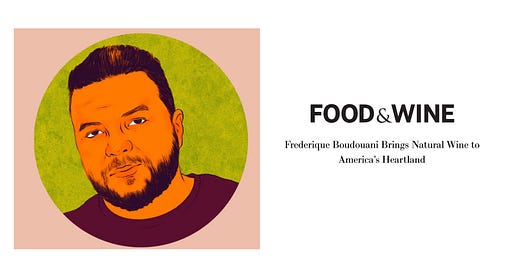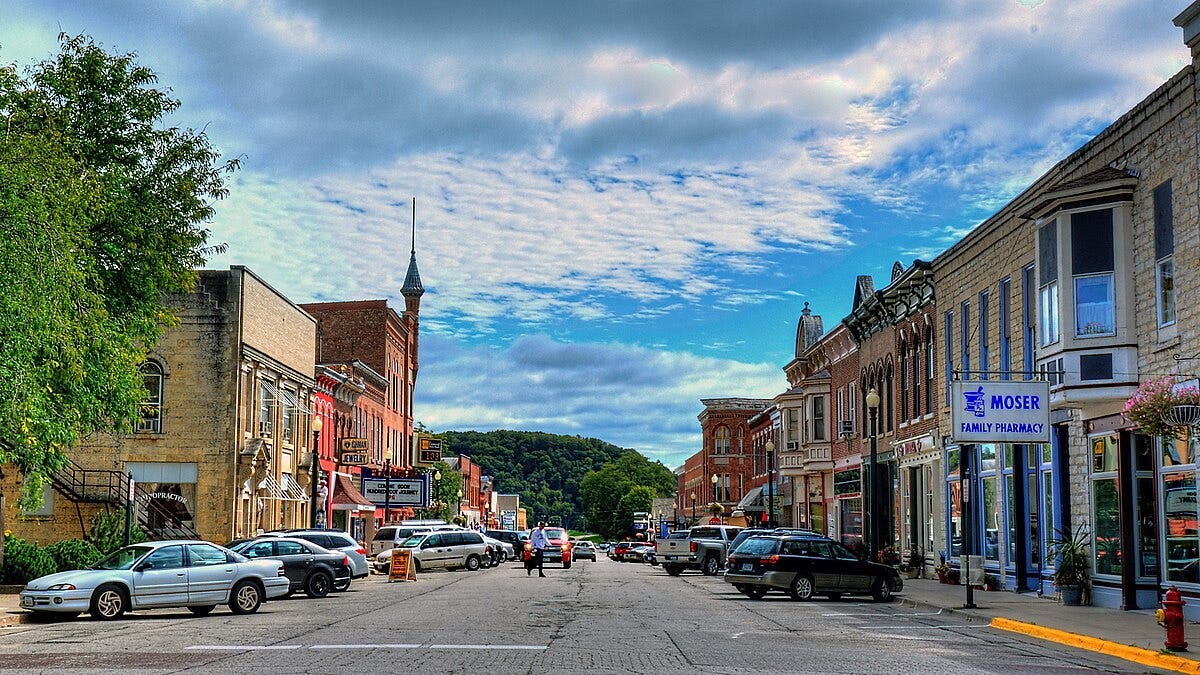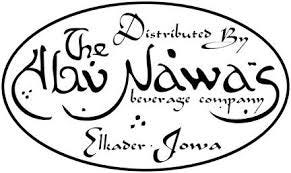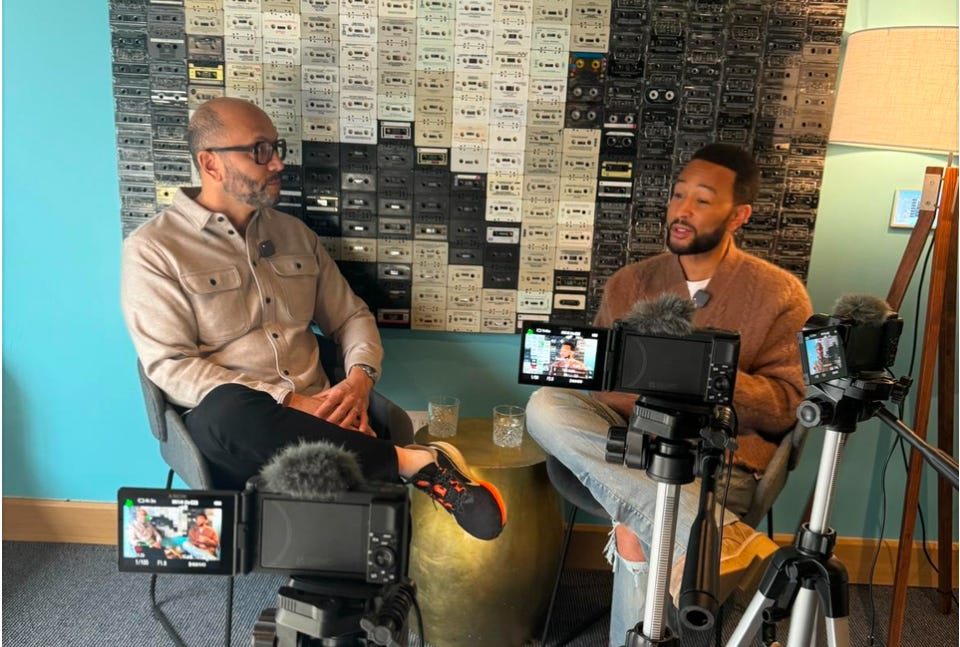Natural Wine, an Algerian Immigrant, and the American Dream in Elkader, Iowa
When Food & Wine Erased My Story, I Decided to Share the Full Version
Back in 2019, deep in our natural wine obsession, my wife Ally Jane and I visited a small California winery where the owner mentioned something unexpected—a Muslim-owned distributor in a tiny Iowa town selling a ton of his wine. That was all I needed to hear. I had to know more.
That distributor turned out to be Abu Nawas Beverage Company, run by Frederique Boudouani in Elkader, Iowa. After I tracked down Frederique, our conversation turned into a story for Food & Wine—a piece about an unlikely journey to happiness in small-town America. But when I recently updated my website, I realized the story had vanished.
Back then, Food & Wine cut my 1,400-word draft down to 500. I was shocked their edit worked—but now that it’s gone, nearly five years later, it feels right to share the full version. So here it is—the deluxe edition of the demo, if you will—exactly as I submitted it on April 29, 2020, and hopefully on the internet forever.
111 Main Street could not be a more American address. It’s so authentic that it sounds made up. It brings to mind a tidy storefront from a TV sitcom about a wholesome, family owned business in a small town. In reality, the address—home to the Abu Nawas Beverage Company in Elkader, Iowa—is even more American than it sounds.
“Honestly, I came here to live my American dream. I didn’t come here to change anybody’s mind or proselytize or convert them to anything. If people are willing to share that life with me, that’s for the better.” Frederique Boudouani, 45, speaks with an accent that distinctly reflects both sides of his origin—he was born in Algeria, to an Algerian father and a French mother. He now lives in Elkader where he owns Abu Nawas, a natural wine and craft beer distributorship.
After graduating from university in France, Boudouani moved to Boston to attend graduate school. But in 2001, he felt significantly affected by the events of 9/11.
“In Boston, it was bad enough if you were [Middle Eastern and] born here. But if you actually had a connection to that part of the world, it was a million times worse.” Boudouani then started to study his Islamic roots, and the history of his religion in America, with an eye on leaving Boston for someplace more accepting.
What he learned was surprising. The first mosque in America, the Mother Mosque of America, was built in Cedar Rapids, Iowa, in 1934. Further research led Boudouani to Elkader, Iowa. Located 75 miles north of Cedar Rapids, Elkader was named after Emir Abdelkader, the Algerian religious and military leader who resisted the French Colonial rule of Algeria in the nineteenth century.
“It’s the only state in the union that has a town that’s named after an Arab Muslim. He happens to be kind of the George Washington of Algeria.” Boudouani then told the story of Timothy Davis, the American land developer who founded Elkader in 1846. Davis had been inspired by Emir Abdelkader’s fight, which he’d read about in American newspapers. “My personal theory is that America was such a young country at the time, that people really sympathized with people seeking freedom.”
Despite existing just 75 miles from Cedar Rapids, which has a relatively large Muslim population, Elkader’s name can be deceiving; before Boudouani arrived, Elkader was home to exactly zero Muslims.
Mr. Boudouani’s partner, Brian Bruening, grew up in New Hampton, Iowa. When visiting Bruening’s family, the couple first visited Elkader so that Boudouani could send his Algerian father a photograph of himself in front of its welcome sign. After several road trips through the state, they began to feel connected to Elkader.
“Elkader kept haunting us for some reason. We kept coming back here.” In 2006, the Boudouani and Bruening made a clean break from Boston, relocating to the tiny community of Elkader, where they opened its first Algerian restaurant, Schera’s. Neither of them had restaurant experience—Boudouani was a computer engineer and Bruening was in college admissions—but food, beverage and entertaining were recurring themes in their lives, so they naturally gravitated towards a restaurant. But they didn’t feel immediately welcome in Elkader, which at the time, had just 1,500 residents.
“People had a problem with a gay Muslim coming to their town. I vividly remember this lady that had a bed & breakfast, she was up in arms and vocal about it. But then the people that were driving three hours from Des Moines were not just having dinner at our restaurant, they were staying at her bed & breakfast and going to the coffee shop and the antique mall. Really, the restaurant became a miniature economic boom for everyone.”
Soon, people from Chicago, Minneapolis and Milwaukee began to visit Schera’s. Their cities had significantly larger Muslim communities, but now, Elkader’s name had an Algerian destination attached to it—a connection that drew people.
“It slowly turned into not just a restaurant but a cultural gathering place, where people would drive two or three hours just to come and have the experience.” Boudouani cites Schera’s as a magnet that pulled nearby Muslim communities to Elkader. But less than a year after opening, a natural disaster put his restaurant and his community to the test.
“In the spring of 2006, the Des Moines Register—Easter weekend, of all weekends—did this huge profile on us. The summer was really looking up and then, the biggest flood in Iowa’s history happened. And it decimated not only this town, but us included.”
Boudouani describes the 31-foot water level that destroyed 32 homes and many Elkader businesses. He thought for certain that his restaurant, and his short-lived time in Elkader, was finished—Schera’s had been open for less than a year and it was barely off the ground. But when Elkader’s residents and the surrounding communities rallied to help, he knew he’d chosen the right home.
“Living through that experience—how much people went out of their way and came and helped, and sent checks.” Boudouani still gets choked up when he tells the story of a flood that happened 13 years ago. Thanks to donations and volunteer labor, Schera’s was back in business and felt more a part of Elkader than ever. Soon, its visitorship extended beyond the Midwest, as word spread to places as far away as Algeria.
“I remember, maybe five or six years ago, there was an Algerian group that visited. I’m the de facto translator—the cultural Attache. They were asking questions like, ‘How big is the Algerian community in Elkader,’ and I was like, ‘You’re looking at it.’” According to the 2010 census, Elkader is 98.7 percent white. “If I disappeared, a big chunk of the diversity would go away.” Boudouani laughs.
Boudouani’s French mother instilled in him a love of wine and beer.
“When I started the restaurant, I took great pride in the wine and beer list. I thought—I might be drinking all this myself, but it’s going to be an epic list.” In order to keep interesting beverages in stock, he was driving several hours each week to pick up a cool case of wine or a unique keg of beer, a chore that took a lot of time and still didn’t generate the right results. With nobody in Iowa distributing the beverages he wanted, Boudouani took matters into his own hands.
“I started Abu Nawas in the summer of 2011, named after a Persian poet from the eighth century that wrote a lot of poetry about drinking wine and beer and debauchery.” The natural wine and craft beer movements have gained momentum in the United States, but the former remains largely relegated to metropolitan areas. It’s not so easy to find a bottle of unfiltered, barnyardy wine in small town America. But Boudouani has further challenged his fellow residents and visitors by offering an extensive list.
Boudouani’s taste in beverages runs parallel to his own life, in which he’s consistently challenging norms. “One of the breweries that I carry is a husband and wife in Belgium by the french border, and they’re high school teachers during the day. In the evening, they’re in the garage brewing their beer. That’s kind of amazing. I have this weird obsession with craftsmen that like to do something where everybody else is telling them not to do it that way.” Boudouani becomes excited as he describes specialty wines and beers from the tiny makers he seeks out.
“To me, the amazing part about the whole story is the open-mindedness of Iowans in the 1800s. It’s a tradition that translates to this day. I have to believe that if you founded a town, that has to be something meaningful and important in your life. Yet you have the presence of mind to name it after somebody from another part of the world. You don’t share his language, religion or culture.”
When Boudouani left Boston, middle America seemed like an unlikely place to feel more accepted—to establish roots and engrain himself in the culture. As much as Boudouani felt others had misconceptions about him, he placed similar stereotypes on them. But Boudouani has found success and happiness in Elkader.
“We’re all full of stereotypes…” Boudouani pauses to consider the many people he’s met since moving to Elkader. “...And I think it’s really beautiful when we’re proven wrong.”
All 20 episodes of my podcast, Identified Season 1 are live now. Episode one is with Karen Ayers, a living descendant of the man who enslaved my paternal ancestors. After that, it’s a rapidly growing list of musicians, comedians, authors, chefs and friends talking about family. Identified is available on all major podcast platforms, 100% free and ad free. You can watch short video clips on YouTube and Instagram. Watch for Season 2 in 2025.
Listen: Apple Spotify Amazon Bandcamp Website
My memoir is called My Life in the Sunshine. You can order it here, or listen to the audiobook on Spotify.
I hope to see you somewhere soon. Upcoming events are always listed here, and now include Mississippi and Connecticut in April 2025.
Nabil Ayers / Brooklyn









That was a good trip :)